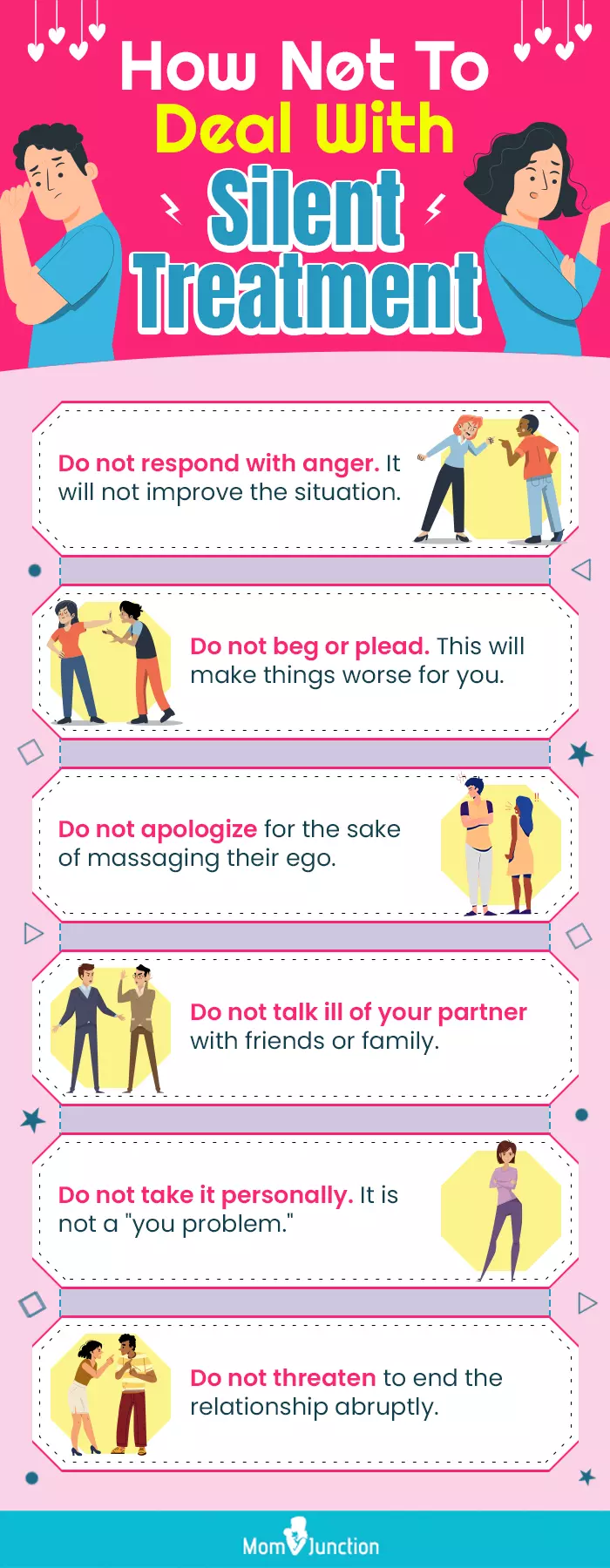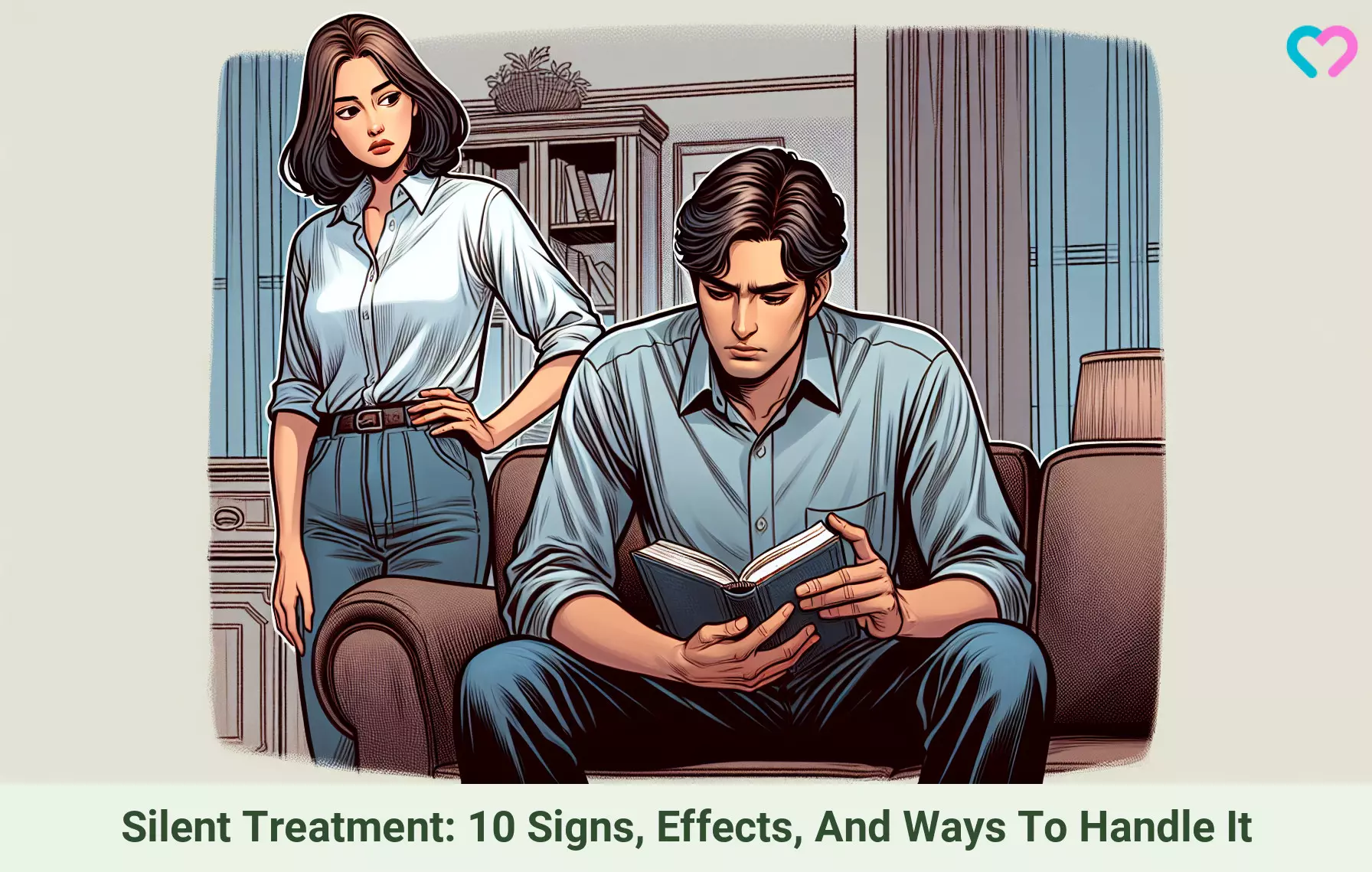
Image: Shutterstock
You enter a relationship with a bag full of anticipation, expectations, hopes, desires, dreams, and tons of love. But what if the initial excitement fades gradually and your partner starts giving you the silent treatment? Having differences, arguments, and conflicts in a relationship is normal but being given the cold shoulder by the love of your life can be painful.
So, are you being subjected to silent treatment by your special one or do you feel like you’re being constantly ignored? Read this post as we explain the concept of silent treatment, its signs, reasons people use them in relationships, and ways to deal with them.
Key Pointers
- Silent treatment is not a healthy form of communication and can turn abusive if it continues over time.
- It can have emotional and psychological effects on the receiver and may even break relationships.
- Boundaries help deal with people who give you the silent treatment and self-care can help you handle the situation better.
What Is Silent Treatment?
The silent treatment is basically avoidance or ignoring someone, intentionally or unintentionally. It is the refusal to communicate verbally or acknowledge the other person. This is usually seen in romantic relationships, but it can also happen with friends and family.
The silent treatment is also known by other names, such as shunning or stonewalling. It can be fleeting or long-lasting. A person may decide to step back from a heated discussion to collect themselves or or use silent treatment to get out of a situation, which can last for days or weeks.
Is Silent Treatment A Form Of Abuse?
Silent treatment can be considered abuse, depending upon the intention. Not everyone can articulate their feelings into words; some may use silence as a defense mechanism when feeling overwhelmed. But when silence is used to create an emotional barrier between two people, it crosses into abusive territory.
The silent treatment can hamper even the best of romances because it targets the most vital part of any relationship; communication. Furthermore, it becomes abusive when the person on the receiving end feels hurt or ostracized, which can affect their sense of belonging, self-esteem, control, and meaningful existence (1).
 Research finds
Research finds
How To Identify Silent Treatment In Relationships?
The silent treatment can be challenging to identify because it does not leave any physical signs of torture.
- Using silence to hurt you: When your partner deliberately uses silence to inflict emotional pain, it indicates a severe imbalance in communication and trust within the relationship.
- Going for long periods without talking: Your partner refuses to talk to you for extended periods of time that can go on for days and weeks and stops only if you apologize.
- Ignoring you intentionally:You may notice that your partner talks to other people normally, but begins rebuffing you in a conversation.
- Blaming you for silence: Your partner may use the silence to make you feel guilty for their behavior or make you feel like you deserve the treatment.
- Keeping silent when things do not go their way: Your partner may use silence to control you in situations that do not go as they plan.
- Manipulating you through silence: Silent treatment is one of the most common signs of manipulation in a relationship. Your partner uses silence as a tool to manipulate your behavior. They forcefully influence your decisions through silence to match their wants.
- Using silence to avoid responsibility: Your partner may shut down or retreat into themselves when you are pointing out their negative behaviors, so they can avoid taking on any responsibility for their actions.
- Refusing to acknowledge you: Your partner refrains from reciprocating your gestures and your attempts to talk it out until you implore and appease them.
- Affecting you psychologically: Your partner’s behavior has a negative impact on your mood and psychological well-being, making you feel isolated, anxious, and confused.
- Ignoring you virtually: Your partner may be giving you the silent treatment virtually too. They may leave you to read, rebuff your opinions, not respond to your texts for hours, or refuse to answer any of your calls.

Why Do Partners Use Silent Treatment?
Some people may use silent treatment as a passive-aggressive response to gain control or power over others. People with traumatic childhood experiences may also shut down because they cannot share their feelings.
- Communication issues: They might be unable to explain their feelings, so they use silence to make themselves heard.
- Immaturity: An immature person may use techniques like silent treatment to avoid confrontation and ignore you because they know they are not completely right. This triggers an intense feeling of alienation.
- Power dynamics: Your partner may have meted out the silent treatment to influence or control your behavior. This can be due to their control issues or desire to have power over you.
- Punishment: An apathetic partner may use it to punish you for something they are unhappy about. This form of punishment can make you feel left out and alone.
- Learned behavior: Your partner may have grown up in an environment where silent treatment is the go-to method whenever there are problems, and they now view it as a normal reaction to arguments.

 Quick tip
Quick tipWhat Are The Effects Of Silent Treatment On Relationships?
The silent treatment can destroy the emotional intimacy and connection between two people.
- A couple lacking communication may have low relationship satisfaction, leading to both parties suffering from negative feelings.
- The person receiving the silent treatment can feel dejected, isolated, frustrated, and angry. When a person’s feelings are ignored, they tend to feel unloved, unworthy, and insignificant.
- The conflicts and issues within the relationship will not be resolved if the couple substitutes healthy discussion with the silent treatment, with one partner spurning the attempts of the other for fruitful communication.
- It can cause behavioral changes in the receiver. They will question themselves and start to adopt a behavior that would please their partner, deviating from their true selves to avoid the silent treatment.
 Point to consider
Point to consider
How To Handle Silent Treatment With Dignity?
Dealing with silent treatment can be tricky because it can make you restless. But tackling it in a way that doesn’t aggravate the situation is crucial.
- Share your concerns: The first step to handling silent treatment is addressing your partner’s behavior. Let them know how you feel when they start snubbing you. Make sure the way you communicate is not patronizing, so they know you are there to listen without any judgments.
- Establish boundaries: Sometimes, setting boundaries can help you introspect and understand if the silence between you and your partner is becoming unhealthy. If you realize you have been ignoring your partner inadvertently, do not hesitate to apologize.
- Observe behavior: After voicing your concerns to your partner, you can now wait and see if they are open to taking your suggestions and implementing them by improving the way you communicate as a couple.
- Practice self-care: Self-care can also be an effective way to handle silent treatment. Since it can negatively impact your emotional and social health, taking care of yourself is necessary. Some ways to practice self-care are reading, journaling, surrounding yourself with people you care about, and practicing mindfulness.
- See a therapist: With your partner’s consent, you both may see a counselor to get an objective view and understanding of the issue and relationship. A professional’s advice can help both of you reflect on and deal with the situation better.
Reacting with grace in the face of silence demonstrates emotional maturity and a commitment to resolving conflicts in a constructive manner. An anonymous blogger shares her experience of how silent treatment is the best revenge after a breakup. She says, “If there’s something I have learned from relationships’ past, it’s this: silence works a treat (hence the term silent treatment) when you are truly done with someone….
Recently, a guy I would have done anything for let me down for a second time this year but when he sent me a half-hearted apology via text (though my immediate reaction was to send a reply) I thought about it…and then changed my mind…
After that guy attempted to gain my forgiveness with his pathetic apology text message to which I didn’t reply — lo’ and behold two weeks later, he added me on SnapChat! I didn’t follow him back. I thought about blocking him but then I decided to leave him with a little insight into my life through my SnapChat stories…just so he can see how much better off I am without him! He brought that on himself (i).”

Frequently Asked Questions
1. Is silent treatment toxic?
If silent treatment is a rare occurrence in your relationship, you do not have to worry since every relationship has its own set of challenges. But if you’re constantly being subjected to silent treatment by your partner and feel unloved, unwanted, and uncared for, it can be deemed toxic for your relationship.
2. Is silent treatment a form of disrespect?
Silent treatment can be disrespectful or disregarding since it is seen as a form of emotional bullying. If your partner frequently resorts to silent treatment during arguments or difference in opinions, it is most likely the sign of an emotionally abusive relationship. It makes the person on the receiving end question their self-worth, leading to diminished self-respect.
3. What happens when I ignore the silent treatment?
Ignoring your partner’s silent treatment can adversely affect you and your relationships with others. It could make you feel lonely, dispirited, and isolated, which may impact your mental health too. Try to communicate with your partner about how their silent treatment affects you and your relationship. Be honest and stand your ground even if they seem distant.
4. When should I walk away?
Recognizing when a relationship is beyond repair is essential. If the silent treatment becomes a regular occurrence and your partner consistently refuses to communicate or acknowledge your feelings, it may be time to evaluate the future of the relationship seriously. Understanding your limits and prioritizing your emotional well-being is crucial in maintaining healthy connections.
Disagreements in a relationship are bound to occur but silent treatment is not a healthy form of communication. Open discussion will help avoid any misunderstandings that could lead to unnecessary frustration and discontent. Ultimately, if you have confronted your partner about his behavior and they are overlooking or refusing the need to make any efforts to change, it may be time to get away from the toxic situation. However, before calling it quits, analyze and understand both sides and then make a decision in the interest of both you and your partner.
Infographic: What Not To Do While Responding To Silent Treatment
When your partner is giving you the silent treatment, you may feel different things ranging from sadness to anger. It can be easy to let your emotions get the better of you, but it doesn’t serve the relationship. The infographic below details a few things to avoid while dealing with silent treatment.

Illustration: Momjunction Design Team
Illustration: Silent Treatment: 10 Signs Effects And Ways To Handle It

Image: Stable Diffusion/MomJunction Design Team
Are you a victim of silent treatment from your partner? Do you feel ignored? In this gripping video, we bring to you the ways silent treatment is harmful to your relationship.
Personal Experience: Source
MomJunction articles include first-hand experiences to provide you with better insights through real-life narratives. Here are the sources of personal accounts referenced in this article.
i. Why The Silent Treatment Is The Ultimate Revenge After Your Breakup.https://medium.com/live-life-unwritten/why-the-silent-treatment-is-the-ultimate-revenge-after-your-breakup-354b6c495270
References
- Kipling D. Williams et al.; (2016); The Silent Treatment: Perceptions of its Behaviors and Associated Feelings.
https://journals.sagepub.com/doi/10.1177/1368430298012002 - Shilpi Agarwal and Dr. N. Prakash; (2022); Psychological Costs and Benefits of Using Silent Treatment.
https://www.researchgate.net/publication/377187507_Psychological_Costs_and_Benefits_of_Using_Silent_Treatment
Community Experiences
Join the conversation and become a part of our nurturing community! Share your stories, experiences, and insights to connect with fellow parents.
Read full bio of Nancy Landrum
Read full bio of Benidamika J Latam
Read full bio of Siddharth Kesiraju
Read full bio of Apoorva K























